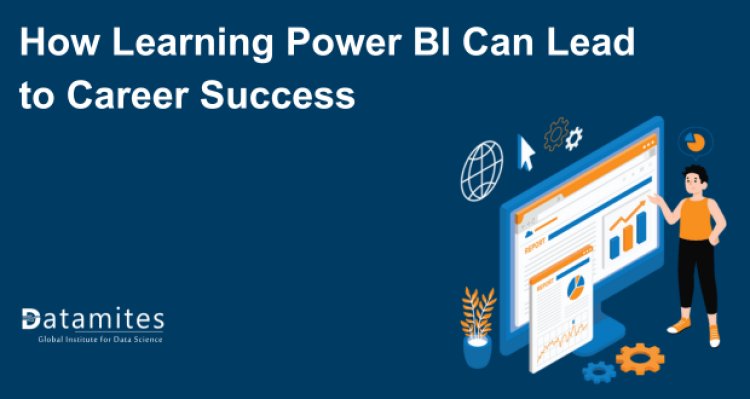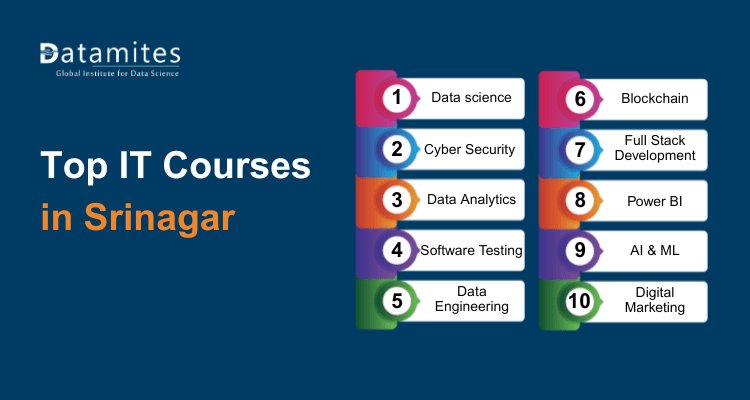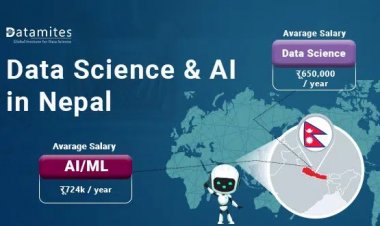How Learning Power BI Can Lead to Career Success
Mastering Power BI enhances data visualization, analytics, and decision-making skills, making professionals highly valuable in today’s data-driven world. A Power BI certification opens doors to high-paying roles in business intelligence, data analytics, and corporate strategy.

Power BI, a robust business analytics tool from Microsoft, offers dynamic data visualization and intelligence features. This article delves into the transformative potential of mastering Power BI for career transitions. Whether seeking a career switch or aiming for advancement within a current role, harnessing Power BI's capabilities can be a catalyst for significant professional growth and success.
Introducing Power BI
In the ever-evolving landscape of career opportunities, individuals often find themselves contemplating transitions to pursue new avenues for personal and professional growth. In such times of change, acquiring fresh skills is not just advantageous but imperative to stay ahead in the competitive job market.
Enter Power BI, a robust business intelligence toolset developed by Microsoft. Its ability to transform raw data into meaningful insights through intuitive visualizations has become a cornerstone of modern decision-making processes. As organizations increasingly rely on data-driven strategies, proficiency in Microsoft Power BI has emerged as a coveted asset for career advancement.
With an impressive 36% market share, Power BI reigns as the top choice for businesses in data analytics. Surpassing Tableau by 1.8 times, its widespread adoption underscores its unmatched popularity and effectiveness in empowering organizations with powerful data-driven insights, as revealed by zoommetrix's latest market analysis.
Refer these below articles:
- Advanced Tips and Tricks for Microsoft Power BI Users
- Top Features of Power BI for Effective Data Analysis
- Mastering Microsoft Power BI: A Guide for Beginners
Discovering the Advantages of Microsoft Power BI
Mastering Power BI offers a wealth of benefits that can profoundly shape one's career trajectory. Firstly, it fosters the development of robust analytical skills by immersing users in hands-on data manipulation and analysis tasks. This practical learning approach deepens understanding of data analytics principles and methodologies.
Additionally, Power BI simplifies the process of data visualization, enabling users to effortlessly craft visually compelling dashboards and reports. This not only enhances team communication and collaboration but also facilitates impactful presentations of insights to stakeholders.
Furthermore, Power BI empowers decision-making by distilling actionable insights from complex datasets. Its interactive visualizations facilitate dynamic data exploration, uncovering valuable insights crucial for strategic decision-making.
Lastly, mastering Power BI enhances employability and opens doors to career advancement. In today's data-centric landscape, professionals proficient in Power BI are highly sought after across diverse industries, from finance to healthcare. By honing skills for Power BI, individuals position themselves for success in a competitive job market, seizing opportunities for growth and advancement.
Maximizing Career Opportunities with Microsoft Power BI Proficiency
A. Exploring Diverse Career Paths:
Investigate the array of career paths available to Microsoft Power BI professionals, ranging from data analysts and business intelligence developers to data scientists and project managers. Explore job opportunities across industries such as finance, healthcare, marketing, and IT, where demand for Power BI expertise is high.
B. Demonstrating Value Proposition:
Showcase your Power BI skills as a value proposition to potential employers by highlighting your ability to transform raw data into actionable insights. Illustrate how your proficiency in Power BI can streamline decision-making processes, drive business growth, and enhance operational efficiency, positioning you as a valuable asset to any organization.
C. Negotiating Salary and Advancement:
When entering salary negotiations or discussions about career advancement, capitalize on your proficiency in Microsoft Power BI. Highlight how your skills directly impact business outcomes and contribute to achieving organizational objectives. Utilize industry benchmarks and certifications to bolster your value proposition and advocate for competitive compensation packages.
For instance, Glassdoor reports an average annual salary of INR ₹6,38,078 for Power BI Developers in India, $109,166 in the US, and £45,823 in the UK according to Talent.com. These figures serve as compelling evidence of the market value of your expertise. By leveraging this data alongside your demonstrated skills, you can effectively negotiate for salary increases and opportunities for career progression that align with your contributions and market standards.
Read these below articles:
- Power BI Course Fee in India
- What would be the Data Analyst Course Fee in India?
- What would be the Data Science Course Fee in India?
Embarking on Your Microsoft Power BI Learning Journey: Steps to Success
A. Exploring Available Learning Resources:
- Online Courses: Enroll in reputable online Microsoft Power BI courses offered by platforms like DataMites, or LinkedIn Learning, covering various aspects of Power BI from beginner to advanced levels.
- Tutorials and Guides: Utilize free tutorials and guides available on websites, YouTube channels, and blogs dedicated to Power BI, offering step-by-step instructions and tips.
- Official Microsoft Documentation: Refer to the official Microsoft documentation and resources, including tutorials, videos, and community forums, to gain insights into Power BI's features and functionalities.
B. Setting Learning Objectives and Goals:
Clearly define your learning objectives and goals, such as mastering specific Power BI features, obtaining certification, or applying Power BI skills to real-world projects. Establishing SMART (Specific, Measurable, Achievable, Relevant, Time-bound) goals will keep you focused and motivated throughout your learning journey.
C. Hands-on Practice and Project-Based Learning:
Engage in hands-on practice by working on real-world projects or datasets using Power BI. Create dashboards, reports, and visualizations to gain practical experience and reinforce your understanding of key concepts. Project-based learning allows you to apply theoretical knowledge to solve practical challenges, accelerating your learning process.
D. Joining Communities and Networking:
Join online communities, forums, and social media groups dedicated to Power BI, such as the Power BI Community Forum or LinkedIn groups. Networking with fellow learners and professionals in the field provides opportunities for collaboration, knowledge sharing, and accessing valuable insights and resources. Active participation in discussions and forums can further enrich your learning experience and expand your professional network.
Demonstrating Power BI Proficiency: Optimizing Resumes and Portfolios
A. Highlighting Power BI Proficiency:
Emphasize Power BI skills prominently in resumes and LinkedIn profiles, listing specific tasks accomplished, such as data visualization, report creation, and data analysis. Use relevant keywords and phrases to catch the attention of recruiters and hiring managers scanning for Power BI expertise.
B. Creating a Portfolio of Power BI Projects:
Develop a comprehensive portfolio showcasing Power BI projects and achievements. Include visually appealing dashboards, reports, and data visualizations created using Power BI, along with brief descriptions outlining the project objectives, methodologies employed, and key insights derived. This tangible evidence of your skills and accomplishments can significantly enhance your credibility and appeal to potential employers.
C. Leveraging Certifications and Endorsements:
Obtain relevant certifications, such as the Microsoft Certified: Data Analyst Associate or Microsoft Certified: Power BI Certification, to validate your Power BI skills. Display these certifications prominently on your resume and LinkedIn profile, and solicit endorsements from colleagues or supervisors who can vouch for your proficiency in Power BI. These credentials serve as valuable indicators of your expertise and commitment to continuous learning and professional development.
Transitioning to Power BI from Various Career Paths
A. Transitioning from Business Analysis:
Highlighting similarities between business analysis and Power BI skills:
- Both roles involve understanding business requirements and translating them into actionable insights.
- Analytical thinking and problem-solving skills are crucial in both fields, as they require the ability to interpret data and make informed recommendations.
- Both require effective communication skills to convey insights and findings to stakeholders.
Leveraging domain knowledge in data analysis and visualization:
- Business analysts often possess deep domain knowledge in specific industries or business processes, which can be valuable in identifying relevant metrics and KPIs in Power BI.
- Understanding the nuances of business operations helps in designing intuitive dashboards and reports tailored to the needs of stakeholders.
- Leveraging domain knowledge enables the creation of insightful visualizations that drive strategic decision-making.
B. Transitioning from Finance and Accounting:
Recognizing the importance of data-driven decision-making in finance:
- Finance professionals are accustomed to working with large datasets and performing complex analysis to support financial decisions.
- Transitioning to Power BI involves utilizing these analytical skills to extract actionable insights from data and drive strategic financial decisions.
Utilizing financial modeling skills in Power BI projects:
- Financial modeling expertise, including forecasting, budgeting, and variance analysis, can be applied in Power BI projects to create dynamic and interactive financial reports.
- Integrating financial models into Power BI dashboards enables stakeholders to perform scenario analysis and make informed decisions based on various financial scenarios.
C. Transitioning from Marketing and Digital Analytics:
Capitalizing on experience with data interpretation and customer insights:
- Marketers and digital analysts are adept at interpreting consumer behavior data and extracting actionable insights to optimize marketing strategies.
- Transitioning to Power BI involves leveraging this experience to analyze customer data and identify trends, preferences, and opportunities for targeted marketing campaigns.
Incorporating marketing metrics and campaign analysis into Power BI dashboards:
- Power BI provides a platform to integrate various marketing metrics such as conversion rates, customer acquisition costs, and ROI into interactive dashboards.
- By visualizing campaign performance and customer engagement metrics, marketers can gain actionable insights to refine marketing strategies and improve overall performance.
D. Transitioning from IT and Software Development:
Leveraging programming skills to manipulate data in Power BI:
- IT professionals and software developers often have strong programming skills that can be utilized to manipulate and transform data within Power BI using Power Query M and DAX languages.
- These skills enable efficient data cleansing, transformation, and modeling, ensuring the accuracy and reliability of insights derived from Power BI reports.
Integrating Power BI with existing software solutions for enhanced analytics:
- IT professionals can leverage their expertise to integrate Power BI with existing software solutions and databases, enabling seamless data connectivity and access to real-time insights.
- Integrating Power BI with custom applications or business intelligence platforms enhances analytics capabilities and provides stakeholders with a comprehensive view of business performance.
E. Transitioning from Project Management:
Utilizing project management skills for effective project planning in Power BI implementations:
- Project managers bring expertise in project planning, resource allocation, and stakeholder management, which are critical for successful Power BI implementations.
- Applying project management methodologies such as Agile or Waterfall ensures efficient execution of Power BI projects, from requirements gathering to deployment.
Demonstrating the ability to drive data-driven decision-making through Power BI insights:
- Project managers can leverage Power BI to provide stakeholders with actionable insights derived from data analysis, facilitating data-driven decision-making.
- Utilizing Power BI to track project metrics, monitor progress, and identify bottlenecks enables project managers to make informed decisions and drive project success.
Also refer these below articles:
- Data Science Career Scope in India
- Data Analyst Career Scope in India
- Artificial Intelligence Career Scope in India
In today's rapidly evolving professional landscape, mastering Power BI stands as a cornerstone for career advancement. Its capacity to seamlessly blend data analysis with dynamic visualization not only bridges various domains but also enhances decision-making processes. Embracing this powerful tool not only enriches one's skill set but also underscores a proactive approach to staying relevant in an era defined by data.
DataMites Institute offers a globally accredited Power BI course, empowering professionals with advanced data visualization and analytics expertise. Through expert-led training and hands-on projects, learners master data modeling, DAX, and interactive dashboard creation. Recognized among India's top analytics institutes, DataMites ensures industry-relevant education tailored for career success. Gain in-demand Power BI skills and excel in data-driven decision-making with DataMites!
DataMites is a renowned global institute at the forefront of data science and artificial intelligence education. As an IABAC accredited institute, DataMites provides top-notch training programs designed to equip professionals with the skills needed to excel in the dynamic fields of data science and AI. Among its comprehensive offerings, DataMites features specialized Power BI Courses aimed at empowering individuals with the expertise to harness the full potential of Microsoft's powerful business analytics tool.





